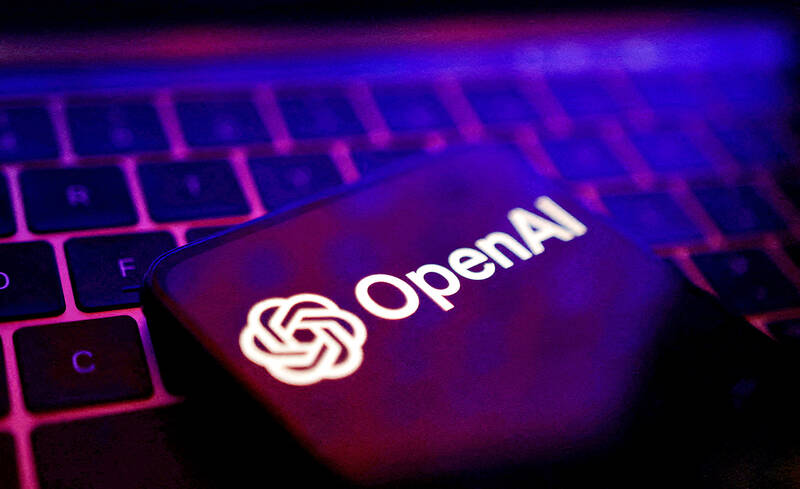OpenAI has completed a deal to raise US$6.6 billion in new funding, giving the artificial intelligence (AI) company a US$157 billion valuation and bolstering its efforts to build the world’s leading generative AI technology.
The funding round was led by Thrive Capital Management LLC, the venture capital firm headed by Josh Kushner, which put in US$1.3 billion. Microsoft Corp, OpenAI’s largest backer, put in about US$750 million, on top of the US$13 billion it had already invested in the start-up, a source familiar with the matter said.
Other investors included Khosla Ventures LLC, Fidelity Management & Research Co and Nvidia Corp, the chipmaker whose powerful processors are at the center of the AI boom.

Photo: Reuters
The OpenAI deal is one of the largest-ever private investments, and makes it one of the three largest venture-backed start-ups, alongside Elon Musk’s Space Exploration Technologies Corp and TikTok owner ByteDance Ltd (字節跳動). The size of the investment underscores the tech industry’s belief in the power of AI and its appetite for the extremely costly research powering its advancement.
Other investors writing major checks included Tiger Global Management LLC, which put in US$350 million, and Altimeter Capital Management LP, which invested at least US$250 million, according to sources familiar with the matter.
Global backers participating in the round included Softbank Group Corp and the new Abu Dhabi-based tech investment firm MGX. Softbank’s investment was US$500 million, according to one of the people. Venture firm Coatue Management LLC also participated.
In a statement, OpenAI said it would use the cash influx to drive forward AI research and increase its computing capacity.
“AI is already personalizing learning, accelerating healthcare breakthroughs and driving productivity,” OpenAI chief financial officer Sarah Friar said. “And this is just the start.”
The huge valuation for OpenAI has transfixed Silicon Valley.
“People are shocked at 150 billion bucks,” said Altimeter chief executive officer Brad Gerstner, speaking on stage at the Madrona Intelligent Applications Summit in Seattle on Wednesday.
However, he also cited reports that the start-up expects to generate more than US$10 billion in revenue next year — adding that a multiple of 10 times projected revenue is not exorbitant for a company about to go public, giving Google and Facebook as comparable examples.
Gerstner called the start-up “the most important AI company in the United States, next to Nvidia.”
Apple Inc did not participate in the deal, although the company was previously in talks to invest. The iPhone maker has a partnership with OpenAI to integrate ChatGPT on its devices and through its Siri voice assistant. As part of that accord, Apple was previously in discussions to get an observer role on OpenAI’s board, although those plans were dropped, sources familiar with the matter said.
In this funding round, OpenAI also wanted investors to refrain from funding five companies they perceive as close competitors, sources said. The list of companies includes rivals developing large language models such as Anthropic and Musk’s xAI. OpenAI’s cofounder Ilya Sutskever’s new company, Safe Superintelligence Inc, is also on the list.
Two AI applications firms, including AI search start-up Perplexity and enterprise search firm Glean, were also named in OpenAI’s conversation with investors, the sources said.

Intel Corp chief executive officer Lip-Bu Tan (陳立武) is expected to meet with Taiwanese suppliers next month in conjunction with the opening of the Computex Taipei trade show, supply chain sources said on Monday. The visit, the first for Tan to Taiwan since assuming his new post last month, would be aimed at enhancing Intel’s ties with suppliers in Taiwan as he attempts to help turn around the struggling US chipmaker, the sources said. Tan is to hold a banquet to celebrate Intel’s 40-year presence in Taiwan before Computex opens on May 20 and invite dozens of Taiwanese suppliers to exchange views

Application-specific integrated circuit designer Faraday Technology Corp (智原) yesterday said that although revenue this quarter would decline 30 percent from last quarter, it retained its full-year forecast of revenue growth of 100 percent. The company attributed the quarterly drop to a slowdown in customers’ production of chips using Faraday’s advanced packaging technology. The company is still confident about its revenue growth this year, given its strong “design-win” — or the projects it won to help customers design their chips, Faraday president Steve Wang (王國雍) told an online earnings conference. “The design-win this year is better than we expected. We believe we will win

Chizuko Kimura has become the first female sushi chef in the world to win a Michelin star, fulfilling a promise she made to her dying husband to continue his legacy. The 54-year-old Japanese chef regained the Michelin star her late husband, Shunei Kimura, won three years ago for their Sushi Shunei restaurant in Paris. For Shunei Kimura, the star was a dream come true. However, the joy was short-lived. He died from cancer just three months later in June 2022. He was 65. The following year, the restaurant in the heart of Montmartre lost its star rating. Chizuko Kimura insisted that the new star is still down

While China’s leaders use their economic and political might to fight US President Donald Trump’s trade war “to the end,” its army of social media soldiers are embarking on a more humorous campaign online. Trump’s tariff blitz has seen Washington and Beijing impose eye-watering duties on imports from the other, fanning a standoff between the economic superpowers that has sparked global recession fears and sent markets into a tailspin. Trump says his policy is a response to years of being “ripped off” by other countries and aims to bring manufacturing to the US, forcing companies to employ US workers. However, China’s online warriors